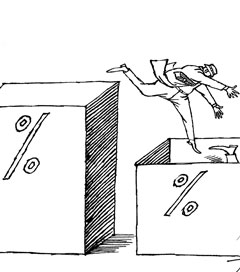Our current economic discourse in the United States is pervaded by fatalism. Leave aside the people who insist that somehow President Obama has destroyed capitalist incentives by passing Mitt Romney’s health care plan and threatening to raise tax rates to Clinton-era levels. Even among people who should be sensible, you hear many assertions that run something like this: historically, recovery from financial crisis is usually slow, so we have to accept a slow recovery this time around too.
Actually, that’s more or less what Mr. Obama has been saying.
This fatalism is deeply destructive — because there’s no good reason for us to experience many years of high unemployment. What historical experience shows isn’t that there’s no answer to post-crisis slumps; it only shows that most governments have responded to such slumps with the same kind of fatalism and learned helplessness we’re showing now.
We are not, after all, suffering from supply-side problems. We don’t have high unemployment because workers lack the necessary skills, or are stuck in the wrong industries or in the wrong locations. The hypothesis that we’re mainly suffering structural unemployment has been repeatedly shot down by evidence. This is a demand-side slump; all we need to do is create more demand.
So why is this slump, like most slumps following financial crises, so protracted? Because the usual tools for pumping up demand have reached their limits. Normally we respond to demand-side slumps by cutting short-term nominal interest rates, which the Federal Reserve can move through open-market operations. But we now have severely depressed private demand thanks to the housing bust and the overhang of consumer debt, so even a zero rate isn’t low enough.
So what’s the right response? Should we just throw up our hands, and say that the 12 million or so adults who should be working and are out of work, and the roughly $1 trillion per year of output we should be producing and is not getting produced, are just facts of life?
Or should we be using unconventional policies to deal with an abnormal situation?
The answer seems obvious. We should be using fiscal stimulus; we should be using unconventional monetary policy, including raising the inflation target; we should be pursuing aggressive measures to reduce mortgage debt. Not doing these things means accepting huge waste and hardship.
But, say the Serious People, there are risks to doing any of these things. Well, life is full of risks. But it’s simply crazy to put a higher weight on the possibility that the invisible bond vigilantes might manifest themselves, or the inflation monster emerge from its secret cave, than the continuing reality of enormous human and economic damage resulting from doing nothing.
Truthout has licensed this content. It may not be reproduced by any other source and is not covered by our Creative Commons license.
Paul Krugman joined The New York Times in 1999 as a columnist on the Op-Ed page and continues as a professor of economics and international affairs at Princeton University. He was awarded the Nobel in economic science in 2008.
Mr Krugman is the author or editor of 20 books and more than 200 papers in professional journals and edited volumes, including “The Return of Depression Economics” (2008) and “The Conscience of a Liberal” (2007). Copyright 2011 The New York Times.
Join us in defending the truth before it’s too late
The future of independent journalism is uncertain, and the consequences of losing it are too grave to ignore. To ensure Truthout remains safe, strong, and free, we need to raise $43,000 in the next 6 days. Every dollar raised goes directly toward the costs of producing news you can trust.
Please give what you can — because by supporting us with a tax-deductible donation, you’re not just preserving a source of news, you’re helping to safeguard what’s left of our democracy.
